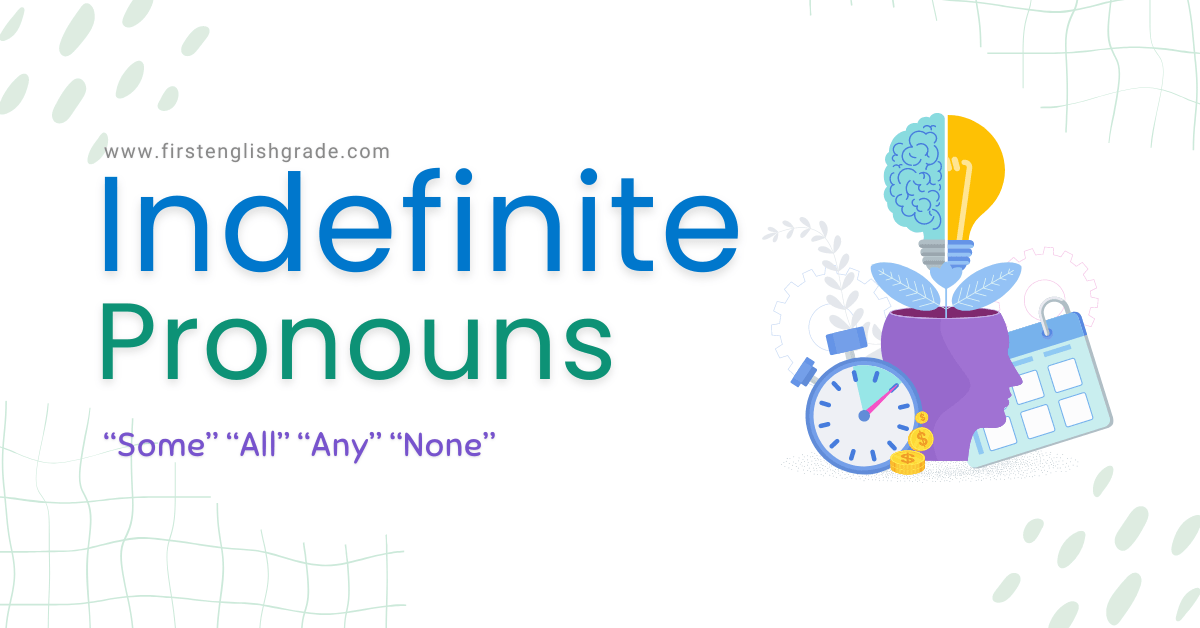

Pronouns are like magic words in the English language. They help us communicate smoothly by replacing nouns, making sentences less repetitive and more engaging. One fascinating category of pronouns is the “indefinite pronouns.” Let’s dive into the world of indefinite pronouns, exploring their types, usage, and why they’re so essential for effective communication.
Indefinite pronouns in English grammar are the pronouns that do not point to specific people, places, or things. Instead, they refer to non-specific groups or quantities. For example, consider the sentence: “Someone left their umbrella in the hallway.” Here, “someone” is an indefinite pronoun that refers to an unknown person.
Indefinite pronouns are a category of pronouns used in the English language to refer to non-specific people, things, or quantities. Unlike definite pronouns, which specifically point to particular individuals or objects, indefinite pronouns provide a general or unspecific reference. They play a crucial role in enhancing language flexibility, avoiding repetitive phrasing, and maintaining a sense of mystery or inclusivity in communication. Examples of indefinite pronouns include words like “someone,” “anything,” “everyone,” “nothing,” and “many,” among others.
Indefinite pronouns come in various types, each serving a specific purpose in English grammar and language. Let’s take a closer look at these categories and their examples:
These pronouns refer to a single person or thing. They are used when you’re talking about each individual as a separate entity.
Plural indefinite pronouns are used when you’re referring to more than one person or thing without specifying exact numbers.
These pronouns can be singular or plural, depending on the context.
Understanding these types of indefinite pronouns allows you to express ideas with precision while maintaining a sense of flexibility. Whether you’re talking about individuality, groups, or general quantities, the diverse range of indefinite pronouns empowers you to communicate effectively and elegantly.
Indefinite pronouns may seem like a linguistic puzzle, but they’re actually quite simple once you see them in action. Let’s explore some real-life sentences to better understand how these pronouns work:
These examples showcase how indefinite pronouns smoothly replace nouns and add flexibility to your sentences. Whether you’re chatting with friends or writing a formal essay, indefinite pronouns make expressing yourself clear and straightforward.
Imagine a dance where all the dancers move in perfect sync. Similarly, in sentences, the subject and the verb need to match in number for harmony. When it comes to indefinite pronouns, ensuring subject-verb agreement is crucial.
Let’s break down how subject-verb agreement works with indefinite pronouns:
Remember, maintaining this agreement between subject and verb ensures that your sentences are grammatically correct and easy to understand.
Subject-verb agreement isn’t just about rules; it’s about clarity. When your subject and verb don’t match in number, it can lead to confusion and misunderstanding. Consider this sentence:
The mismatch between the singular subject “Every student” and the plural verb “have” creates confusion. The correct form should be:
By adhering to subject-verb agreement rules, you enhance the clarity and readability of your writing, making it easier for your audience to grasp your intended message.
Navigating the world of indefinite pronouns might feel like embarking on a language adventure. However, even the most fearless explorers can stumble upon common pitfalls. Let’s shed light on these mistakes so you can confidently avoid them:
Indefinite pronouns step onto the stage when you want to talk about people, things, or concepts in a general or non-specific manner.
Definite pronouns, on the other hand, step up when you want to be clear and specific about who or what you’re referring to.
Imagine a canvas awaiting your creative touch. Indefinite pronouns are the brushstrokes that infuse your conversations and writing with color and depth. They play a pivotal role in making your English language engaging, versatile, and relatable. Here’s how you can use the magic of indefinite pronouns in both spoken and written communication:
In everyday conversations, indefinite pronouns help you strike a casual, friendly tone while maintaining clarity. They allow you to express ideas without delving into specifics, making interactions feel natural:
By using indefinite pronouns like “sometime” and “thing,” you create an open-ended, relaxed atmosphere that’s perfect for casual conversations.
In writing, indefinite pronouns serve as your creative palette, adding depth and variety to your narratives and descriptions:
By expanding on the use of “many” and providing context, you create a vivid image in the reader’s mind, immersing them into your story.
In both conversations and writing, indefinite pronouns strike a balance between clarity and mystery. They provide enough information to communicate your message effectively while leaving room for imagination:
Here’s a list of common indefinite pronouns with example sentences:
Singular Indefinite Pronouns:
Plural Indefinite Pronouns:
Singular/Plural Indefinite Pronouns:
Exercise 1: Fill in the Blanks with Indefinite Pronouns
Complete the following sentences by choosing the appropriate indefinite pronoun from the list provided. Remember to pay attention to the context of the sentence.
Exercise 2: Choose the Correct Indefinite Pronoun
Choose the correct indefinite pronoun to complete the following sentences.